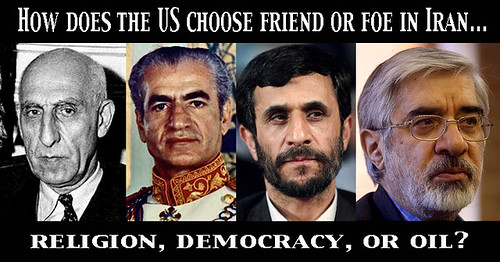
Americans and many others around the world are hoping for an outcome to Iranian election away from the religious hardliners like President Mahmoud Ahmadinejad, but even if Mir-Hossein Mousavi takes power, several things are unlikely to change, and most of them are the points of tension between the US and Iran.
For example, while a new government might be less likely to call for Israel to be "wiped off the map" (or "disappear" from the map as many translators said was more accurate), they will still probably be sympathetic to the plight of Palestinians, fellow Muslims who are undeniably being killed in far larger numbers than Israelis, and systematically forced off their land by Israeli settlers, a process we would call ethnic cleansing anywhere else.
Likewise, it's hard to see them forsaking Hezbollah in Lebanon, given the multiple invasions by Israel and the many Muslims (and Christians) killed there, first in "overkill" to drive the PLO out of the country, then in attempts to crush Hezbollah whose ranks were swelled with Lebanese angered by the first war that caused so much death and destruction beyond its supposed targets.
What is especially unlikely to change is a sense of national ownership of their oil reserves and the income derived from it. Iran has the second or third largest oil reserves in the world. One of our goals in the Iraq War was to force them to give up 88% of their oil income to oil companies as stated in a Bush sponsored Hydrocarbon Law. For comparison, the Saudis, only give up about half. Despite Bush and members of both parties in Washington strong-arming Iraqis to pass it, they could only get the Iraqi cabinet to pass it, never the whole parliament--even when the oil companies offered millions in bribes to each member. And in spite of a war and occupation that cost the lives of over a million Iraqis.
If Iraq won't surrender their oil after all that, the tools of the oil industry in Congress would be foolish to expect the Iranians to give up theirs after an election. The truth is, real democracy makes it harder for corporations to cheat countries out of their natural resources. The oil companies would have had an easier time simply trying to bribe the handful of mullahs who are the real power behind the throne in Iran, just as they did the Shah, the dictator we installed after we overthrew the last secular, democratically elected leader of Iran, Mohammed Mossadegh. His sin was trying to nationalize his country's oil, which would have cut the big oil companies out of most of the profits. In the 1979 revolution in Iran, students were carrying signs with his photo on it. They had not forgotten who fought for their oil, and they wouldn't forgive someone who gave it away now.
Neither will Iran's antagonism with some of her neighbors diminish.
The Saudi conflict with Iran is likely based oil and who gets to decide how much is pumped and therefore the price as much as the Sunni-Shia rivalry.
Israel doesn't want any strong Muslim country in the region who might check their expansion or even criticize it, so they are unlikely to change much, even if the new government makes peace proposals that offer recognition in exchange for reasonable conditions on how Israel treats Palestinians.
And on the broader global stage, how the US treats a more secular, democratic Iran will depend almost entirely on how compliant they are to oil interests. After all, we overthrew Iran's secular prime minister in 1953, and have embraced the Sunni religious extremist Saudis for decades, even though they are far from democratic and Saudi Arabia supported the 9/11 hijackers who killed 3,000 Americans. Blood is thicker than water, but in Washington, oil is thicker than both (or at least the bribes oil companies give are).
MORE IRAQ OIL THEFT LINKS
 |  |  |  |  |
No comments:
Post a Comment